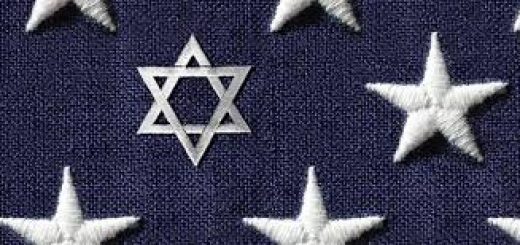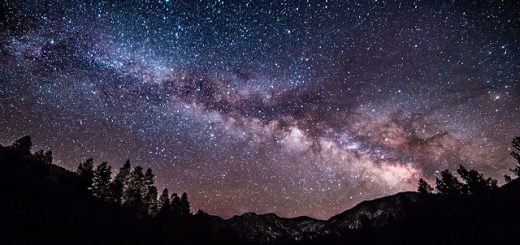Star Power

The symbol commonly known as the Magen David (“Shield of David”) or more colloquially as the “Jewish Star,” is the subject of an unusual responsum written by Rabbi Moshe Feinstein in 1968 (Igrot Moshe, Orach Chaim 3, 15).
The familiar six-pointed polygon yielded by two superimposed triangles adorns countless synagogue ark-curtains and Torah-covers, containers for religious items and pieces of jewelry.
And, of course, the Israeli flag, set between two broad stripes meant to evoke a talit, or Jewish prayer-shawl. It was, in fact, that appropriation of the Jewish star symbol which formed the basis of the question posed to the famed decisor of Jewish law: Since the State of Israel is the fruition of an essentially secular, political dream – Herzl’s Judenstaadt – is the Magen David symbol appropriate as an adornment for religious items?
Rabbi Feinstein replied that regardless of what service the symbol may have been pressed into, it remains an ancient Jewish emblem, and is therefore entirely properly displayed in synagogues and on religious objects.
What the Magen David signifies, however, the revered rabbi continued, is not entirely clear. Despite the hexagram’s antiquity, there seems to be no authoritative Jewish source that addresses its significance.
All the same, Rabbi Feinstein suggests that the six-pointed form symbolizes G-d’s dominion over all of space (“above and below and in all four directions”).
We experience our universe in three spatial dimensions. To pinpoint the location of an object, in other words, one must identify its latitude, longitude and altitude with respect to some other fixed point. Things can be moved in two directions along each of those three axes, and so a six-pointed figure symbolizes all of space – and, in the case of the Magen David, reminds us how the universe is transcended by the Divine.
As to the Jewish Star’s connection to King David, writes Rabbi Feinstein, “perhaps it signifies that David, during the wars he fought, relied on G-d, Who rules over [all of the universe], and thus, as the Torah commanded, never feared mortal kings and their armies.”
G-d’s hand, so apparent to King David, was evident as well to many Jews – even of secular bent – in 1948, when Jews living in the Jewish ancestral land repelled the attack of the Egyptian, Iraqi, Syrian and Lebanese armies set on obliterating the nascent Jewish State and its inhabitants.
Similarly, in 1967, Israel’s routing of the armies and air forces of its belligerent neighbors Egypt, Syria and Jordan (assisted by Iraq, Saudi Arabia, Kuwait and Algeria) – what came to be known as the Six-Day War – was widely regarded as miraculous. The religious Jewish identities of untold numbers of Israeli and American Jews were forged by that summer’s events.
Others, though, less willing to concede supernatural impact on earthly matters, chose to write off Israel’s dazzling victories as the predictable yield of superior military intelligence and fighting forces. That attitude became increasingly common, particularly in the boasts of Israeli leaders.
In 1973, however, amid vocal Israeli confidence in early warning systems and air superiority, came the Yom Kippur War, exposing the limitations of such achievements. Israel – although she thankfully managed to prevail in the end – was not able to forestall – or even foresee – an attack launched against her by Egypt and Syria (again aided by other Arab states). The bubble of Israeli military invincibility was burst.
Two inconclusive wars in Lebanon later, the sobering only continues. Israel, despite its vaunted military might, has become politically precarious. Of late, calls for her destruction – from within, through an unfettered “right of return” for descendents of once-resident Arabs; and from without, in the form of blatant threats from points east – have alarmingly increased, both in frequency and intensity.
Still and all, miracles – of a sort easily overlooked by all but sensitive eyes – abound. Terrorist intentions are foiled, explosives detonate in the hands of their crafters and rockets fall harmlessly in fields. Improbable missions like the recent bombardment of a mysterious, but no doubt worthy, target in Syria succeed. Such small salvations elicit deep gratitude to G-d from religious Jews. And the usual expressions of hubris from others, including all too many Israeli leaders, who rarely speak of – and seem oblivious to – the Divine.
To those, though, who include in their daily prayers a plea for the safety and security of our fellow Jews in the Holy Land, who daily recite specially designated Psalms in their merit, the future of the Jewish presence in the Jewish land – the future of all Jews everywhere – remains not in our hands but in G-d’s.
And, in the light of Rabbi Feinstein’s nearly four-decade-old words, we perceive a subtle but striking irony: The true key to Israel’s security, as unrecognized as it may be to some, has been hiding in plain sight since the Jewish State’s founding, fluttering in the wind above every Israeli government building and military outpost.




Archimedes studied this design, too:
http://home.hccnet.nl/jc.kuiper/archimedes/archim07.htm
I agree with everything Avi Shafran wrote. There is a major misunderstanding, many in the Religious Zionist camp believe that the Agudah is “anti-zionist”. The facts are that Agudah type people are percapita among the biggest visitors to Israel, many (most) have children learning and living there. One reason that secular zionism succeeded in the past was that the love for Zion was in their hearts from their religious ancestors. Therefore they said no to Uganda.
Reciting the prayer for the Medina is often used as a litmus test to determine if one cares about the survival of Israel and its people.In truth, it is a red herring used to deligitimize true Zionists. I just was reading about the escape of the Belzer Rebbe , he got a certificate to enter Mandate Palestine on a short list of “veteran zionists”. Who is more of a zionist than he was, though he had nothing to do with political zionism or pre-messianic speculation. Today secular zionism is having a hard time but Agudah zionism is flourishing. So, in the end, who loves Israel, those who care only for a state like any other state or those who believe in its sanctity?
It is providence that blows up terrorists and whatever that blows up a kallah and her saintly father. It may or may not be the literal interpretation, but apply the words of the prophet (Isaiah 55:8) seriously and leave this type of homelitics to a more appropriate forum.
Our reaction to both tragedy and (miraculous) success is not claim to comprehend or deign to explain why or even just express gratitude. But, we are obligated to understand how we must act in response. Kol Dodi Dofek – fresh and stirring 51 years later.
” The true key to Israel’s security, as unrecognized as it may be to some, has been hiding in plain sight since the Jewish State’s founding, fluttering in the wind ”
– obviously if you believe in G-d the we we do, you must hold that He has awarenes of and stake in eveything. That is a core tenet of our belief. Surely it is also true that there are derech hateva factors and imperatives. Every parent with kids (especially dughters) in shidduchim know they have to put in their hishtadlus to get hem married iff, even though HK”BH is obvisouly the supreme mezaveg zivugimit. This does not mean that a parent’s hishtadlus is not also “key”, it is just operating at a different level. Reminds me of the apocraphyl Telzer chakirah about whether it is the sugar or the stirring that makes the tea sweet.
Almost always in agreement with Mr. Loberstein.
Just one question: Don’t we all agree that we are in the era of “pre-mosiach”? Is that not what our duty is? “tzipiti legeulah” – were you looking forward to the geulah on a daily basis will be one of the heavenly questions asked of us… The saintly Chofetz Chaim heard the footsteps of the Moshiach treading…why don’t we?? OR are you not a fan of Torat Harav Kook.
Almost always in agreement with Mr. Loberstein.
Just one question: Don’t we all agree that we are in the era of “pre-mosiach”? Is that not what our duty is? “tzipiti legeulah” – were you looking forward to the geulah on a daily basis will be one of the heavenly questions asked of us… The saintly Chofetz Chaim heard the footsteps of the Moshiach treading…why don’t we?? OR are you not a fan of Torat Harav Kook.
1— i wait to see an aguda publication saying they are ‘zionist’. like the supreme court and shmutz, we know what we are referring to when using that word.
2– look at the mosdos, gdolim, daas tora etc that aguda zionists and non-zionists turn to. they are parrallel worlds [often in ignorance/denial of the existance/legitimacy of the other]
3– that being said, the premise is true. if one sits in kollel in israel for 1-20 yr, one is less likely to leave. however most will not have to bear many of the burdens of the State– army, making a living etc…in fact one will be living there through the largesse of Others, who, while denying their modus vivendi, nevertheless are forced to foot the bill , in many cases….
The Mogen David showed me something special that perhaps others have noticed. Like any pattern, you must look at it in several ways. Seeing two triangles is, perhaps, the most obvious – Heaven above and Earth below. Seeing six points, all different directions as expressed in the posting, becomes a bit more challenging. The next step is to look deeper and see that there are actually six triangles surrounding a hexagon. What’s interesting is that if you count all the sides of the six triangles, you achieve Chai (6 triangles * 3 sides each = 18) Thus, we see that Hashem not only encompasses unity in all directions but is, in fact, the sustainer of all life.
Glad that 2 people noticed that I was alive. I guess people who write combatively get more attention, but let them have it. There is a lot of misunderstanding about the yshiva and chassidic ideas about Zionism. Perhaps one way to explain it is that they believe that the secular zionists took the term “zionists” but deleted its original meaning. Zionism means that Eretz Yisroel is holy, that a sin in Israel is worse than a sin in the exile. Secular zionism was originally less socialist and athiest, e.g. chovvei zion. It is not the love for Israel that they condemned but the anti-religious nature of zionism which was a desire to expunge religion from Jewish identity. Mizrachi was not messianic in its earlier days.Rabbi Mohilever and Rabbi Reines felt that that the holy land would be the best refuge for the Jews, but it was only when the Mercaz Harav philosophy of Rav Tzvi Yehuda Kook took over that religious zionism became militantly settler dominated to the exclusionof its original goals to put some Judaism into the Jewish State. That being said, every Jew is a zionist, just not all subscribe to its modern transformation. Neturei Karta are a bunch of lunatics.
Do you know that david Ben Gurion only attended a synagogue service in Israel one time/ It was the Friday night when independance was declared and Moshe Chaim Shapira head of the Mizrachi told him “Dovid, at least tonight you have to come with me to shul” and he did.Golda Meir attended Yom Kippur services in Moscow but not in Israel. Eshkol loved to tell shtetle stories but he didn’t go to shul. To do so would have been to betray their socialism. You can admire them for their good qualities but they caused a lot of Sephardim to lose them religious identity and forcibly sent Holocaust surviver children from religious homes to anti religious kibbutzim and told them that in Israel one no longer keeps the Torah. If you knew the truth of secular zionism, you would understand that those who have animosity to the above named people do so for a reason.
A Jewish child in America who goes to Sunday School might know more about the Jewish religion than many secular Israeli children in 2007. Isn’t a tragedy that they don’t even know what Shema Yisroel is?
My zionist credentials are that I have 5 childen there at present and 8 grandchildren. A lot of ‘zionists” talk a good game . The frummies really do go more often , buy apartments, etc. I love everybody, Agudah ,Mizrachi, etc. These intramural debates dont effect our basic belief that all Jews are one family.